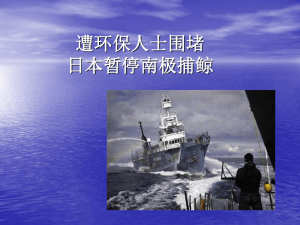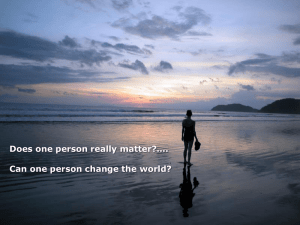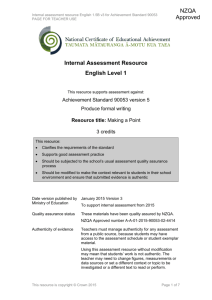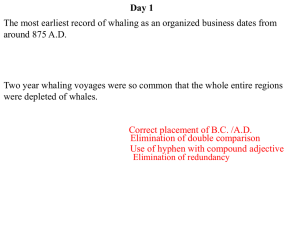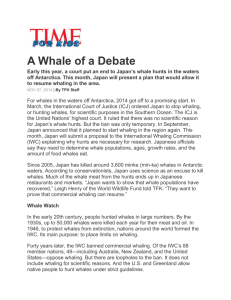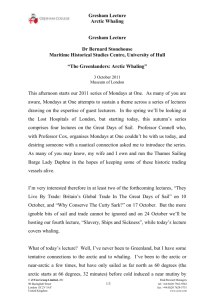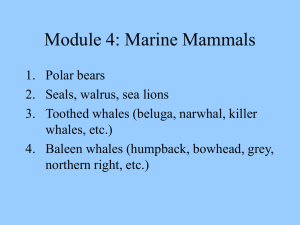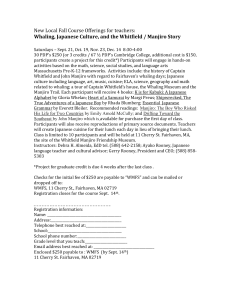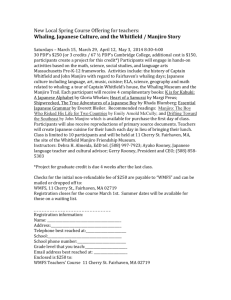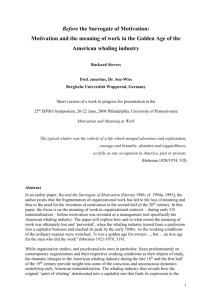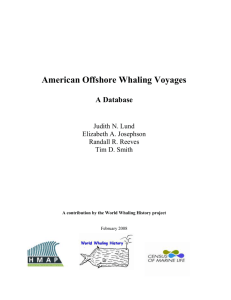Topic Synopsis Hello! My name is Alison Chen, and I`ll be your head
advertisement
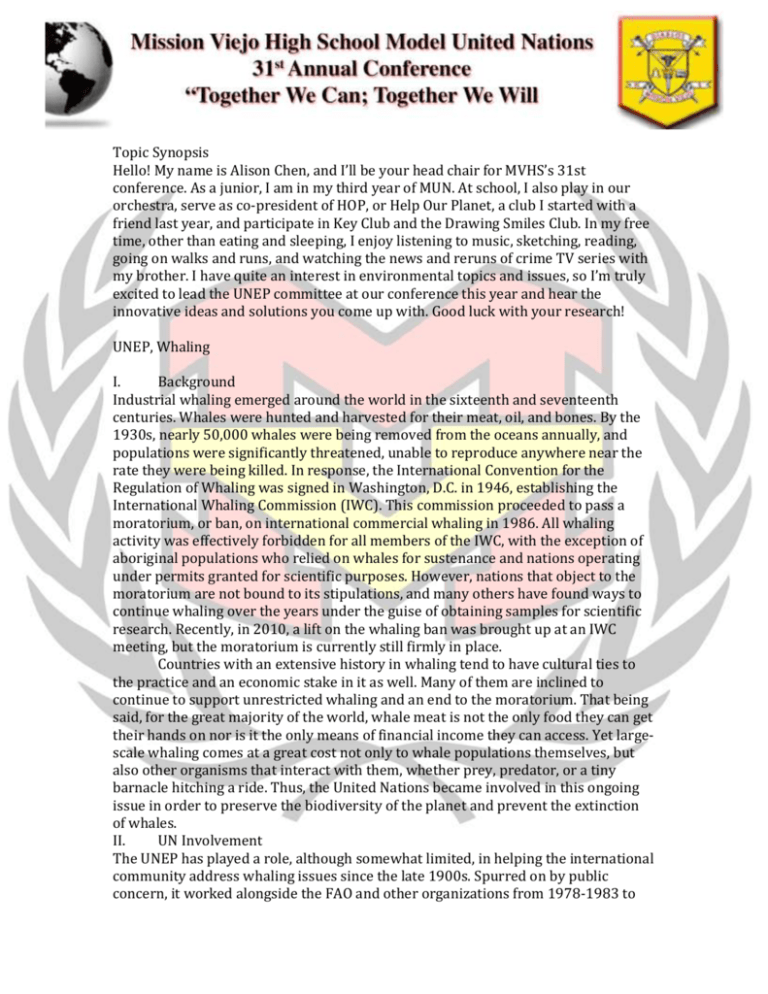
Topic Synopsis Hello! My name is Alison Chen, and I’ll be your head chair for MVHS’s 31st conference. As a junior, I am in my third year of MUN. At school, I also play in our orchestra, serve as co-president of HOP, or Help Our Planet, a club I started with a friend last year, and participate in Key Club and the Drawing Smiles Club. In my free time, other than eating and sleeping, I enjoy listening to music, sketching, reading, going on walks and runs, and watching the news and reruns of crime TV series with my brother. I have quite an interest in environmental topics and issues, so I’m truly excited to lead the UNEP committee at our conference this year and hear the innovative ideas and solutions you come up with. Good luck with your research! UNEP, Whaling I. Background Industrial whaling emerged around the world in the sixteenth and seventeenth centuries. Whales were hunted and harvested for their meat, oil, and bones. By the 1930s, nearly 50,000 whales were being removed from the oceans annually, and populations were significantly threatened, unable to reproduce anywhere near the rate they were being killed. In response, the International Convention for the Regulation of Whaling was signed in Washington, D.C. in 1946, establishing the International Whaling Commission (IWC). This commission proceeded to pass a moratorium, or ban, on international commercial whaling in 1986. All whaling activity was effectively forbidden for all members of the IWC, with the exception of aboriginal populations who relied on whales for sustenance and nations operating under permits granted for scientific purposes. However, nations that object to the moratorium are not bound to its stipulations, and many others have found ways to continue whaling over the years under the guise of obtaining samples for scientific research. Recently, in 2010, a lift on the whaling ban was brought up at an IWC meeting, but the moratorium is currently still firmly in place. Countries with an extensive history in whaling tend to have cultural ties to the practice and an economic stake in it as well. Many of them are inclined to continue to support unrestricted whaling and an end to the moratorium. That being said, for the great majority of the world, whale meat is not the only food they can get their hands on nor is it the only means of financial income they can access. Yet largescale whaling comes at a great cost not only to whale populations themselves, but also other organisms that interact with them, whether prey, predator, or a tiny barnacle hitching a ride. Thus, the United Nations became involved in this ongoing issue in order to preserve the biodiversity of the planet and prevent the extinction of whales. II. UN Involvement The UNEP has played a role, although somewhat limited, in helping the international community address whaling issues since the late 1900s. Spurred on by public concern, it worked alongside the FAO and other organizations from 1978-1983 to create the Global Plan of Action for the Conservation, Management and Utilization of Marine Mammals (MMAP). Under MMAP, a framework for policies of marine mammal conservation has been established. Regional and national action plans for conservation, including research and monitoring and the creation of protected marine areas have also been created. The IWC adheres to MMAP and is a partner of the UNEP. In June 2013, the United Nations finally received the opportunity to directly take action in a whaling dispute and mediate the matter through its International Court of Justice. In the case Whaling in the Antarctic, Australia is bringing charges against Japan, accusing it of continuing to whale commercially and concealing its transgression under the façade of conducting scientific research. Currently, the ICJ is still deliberating on its ruling. III. Possible Solutions Explore methods by which countries that are not bound by the whaling moratorium can be persuaded and swayed towards limiting or ending their commercial whaling without intruding on their national sovereignty. Consider whether or not the current standing ban on whaling should be altered in any way and if any compromises should be made. Examine the loophole of “scientific research” that has been used by various nations to continue their commercial whaling ventures and better prevent such incidents from slipping through in the future. Keep in mind that the UNEP views the preservation of whales around the world with the utmost importance. IV. Bloc Positions 1. Asian Bloc: Whale hunting and consumption is part of the cultures of many coastal or islands nations, including Japan and South Korea. Japan, in particular, has attracted international attention over its continued whaling activities. 2. Latin American Bloc: Members of this bloc have collectively spoken out against lifting the ban on whaling. 3. African Bloc: No African countries are actively whaling any longer. Some coastal nations are members of the IWC, but a majority of the bloc is not. 4. Middle Eastern Bloc: This region is not at the heart of the issue, as no countries in the area conduct whaling. Only one nation is a member of the IWC. 5. Western Bloc: A majority of western nations do not participate in commercial whaling, with a handful of exceptions in the Nordic Sea region. V. Guiding Questions and Helpful Links 1. Is your country a member of the IWC? Do they participate in whaling? If so, what kind and to what extent? 2. Is the right for countries to conduct whaling as they please a matter of national sovereignty, or is it an international issue? 3. Should the moratorium on whaling be lifted? Is there a middle ground to be reached? 4. What can be done to encourage countries to decrease or cease their commercial whaling? http://www.unep.ch/regionalseas/home/mmapover.htm http://iwc.int/home http://www.cms.int/about/intro.htm
